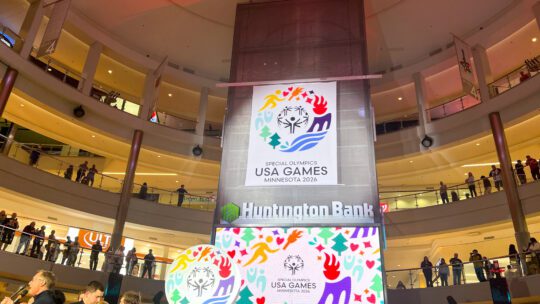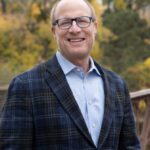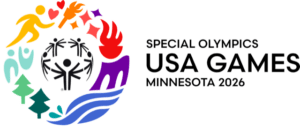
[Editor’s Note: The local organizing committee for the next national Special Olympics USA Games, held in Minneapolis in 2026, chose local agency Haberman to lead public relations around the games.
Agency co-founder Fred Haberman co-created the Volvo for Life Awards to “identify ordinary people doing extraordinary things in their communities,” and he founded the U.S. Pond Hockey Championships, two experiences of many he believes will suit him well to lead communications around the next U.S. games.
PRNEWS spoke to Haberman about his thought process both in pitching the committee and in creating excitement in the three-year lead up to the games.
The interview has been edited for length and clarity.]
PRNEWS: Your agency was named agency of record for the 2026 Special Olympics USA Games. I wanted to talk to you about how that came about and the experience that your agency has that made it a good fit.

Fred Haberman: We're incredibly honored to win this piece of business. In 1991, I was a volunteer for the Special Olympics, when it was last in Minnesota…Seeing the interactions between the athletes and the community was really inspiring for me. And it definitely had a major impact on helping define what I wanted to do next...
My wife and I started the agency, and the mission has remained the same. I define mission as the contribution you make in the world. And our mission is to tell the stories of pioneers who are making a difference in the world …
… We want to support the types of values that the Special Olympics represents. If you look at the tactical side of what they are looking for, we've done it...They are working to get people to show up to the event; we did that with pond hockey. They need somebody to manage the media …thinking through how we're going to work with media sponsors, how we're going to support sponsors, how we're going to think about crisis communications…
PRNEWS: Do you focus your work on local causes and/or locally-based organizations? Or do you typically look at more national organizations?
Haberman: The fact that the Special Olympics happen to be in Minnesota was perfect…But all the stuff that we worked on nationally helps support the work that we've done locally. Because we've worked with these larger media outlets, in addition to the local media outlets. And we know what it's like to put on a big national event, which happens to be based in Minnesota.
PRNEWS: What was the pitching process like?
Haberman: In the end, I wrote a letter to [the committee]. In addition to the RFP that mentioned my experience in 1991, and how powerful that experience was for me, I talked about all the experience that I just mentioned to you...But then going back to how this is the dream opportunity for us because of all the inclusivity goals that the Special Olympics has, in addition to the fact that it's in Minnesota, and then I signed it as a 1991 volunteer. We really resonated with the team. And we put a lot of effort into the RFP response. I really, really wanted to do this.
PRNEWS: The event won’t take place for another three years. How do you manage that process? What are you doing now, in the lead up to the actual event?
Haberman: When you have that kind of time, it's a huge benefit. 2023 is all about planning. It's all about prioritizing.
We did have an event right out of the gates, where we supported a logo reveal…at the Mall of America, announcing the two presenting sponsors...

…We're in the planning phase of identifying who might be some of the other appropriate media partners [other than ESPN], prioritizing different groups that we want to get involved with…and trying to figure out how we can get Lizzo as the main act.
PRNEWS: What are some of the biggest challenges to having so much time?
Haberman: If you focus solely on the event…you miss what we really want to try to accomplish here, which is in growing programs. That and creating a legacy that goes beyond the specific event. And that's what excites me and what takes time to create and develop. That's specific to, for example, creating more unified schools where kids with and without intellectual disability compete in and play sports together. We want to create more schools like that in the state of Minnesota and beyond.
Secondly, we want to create greater awareness [around employment] for folks with intellectual disability...We want to create a greater level of inclusivity in the state of Minnesota and beyond, and those types of initiatives need time to create plans around, and to recruit and educate groups that would support that in the state. And so that that's where I think it's wonderful that we have this type of time. And we have the type of leadership for the games from [President and CEO of the 2026 Special Olympic USA Games] Christine Sovereign...She's really committed to helping support these legacy programs.
PRNEWS: Is there any red thread narrative from previous games? Are you working with any of the folks from the previous games, or will you work with the next group that hosts the games?
Haberman: We get reports [from] the prior games that we are reviewing, and gleaning information from and using that as inspiration for new ideas or supporting ideas that worked. We just completed the Berlin games. There's some really great ideas and programs that were created there; for example, German Vogue had a cover story of photos of the athletes…
There are also protocols that have been set forth, and put down by the larger Special Olympic USA group, related to how we go about accomplishing the communications objectives and the event itself. With that said, they also are open to having a local-oriented program as well. So, the logo in Minnesota is different than the logo was in Orlando…you can put kind of a local flavor to it.
PRNEWS: What are your main goals here? And how are you going to measure success?
Haberman: We're definitely going to be putting into place all the expected communications metrics.... But for me, it's also going to be about not just the lead up to the games, but the years after the games, putting forth a number of how many more unified schools have been listed, jobs that have been created… I'd like to see more than just communications metrics. I'd like to see legacy metrics, which we're working on right now.
